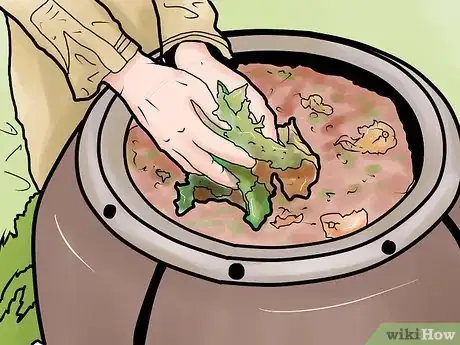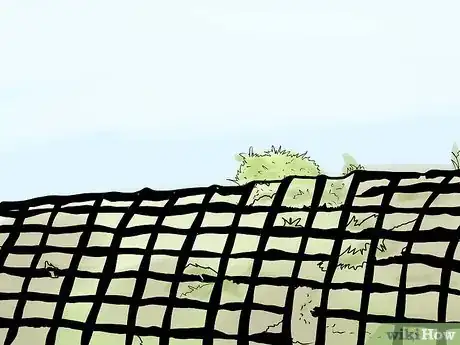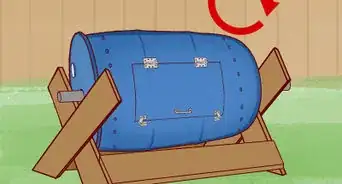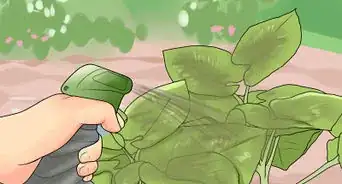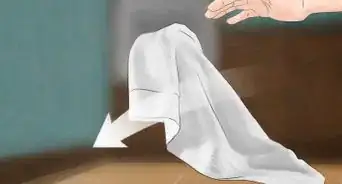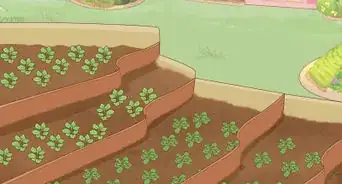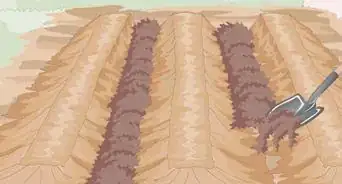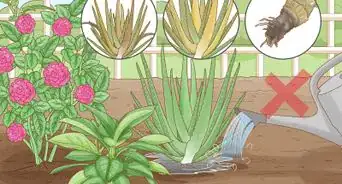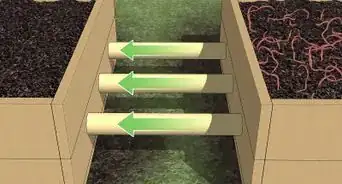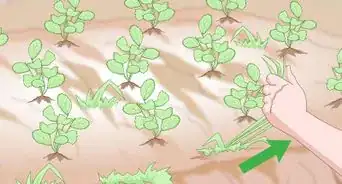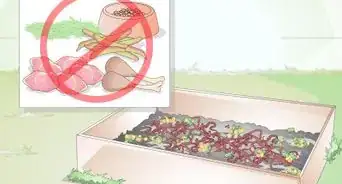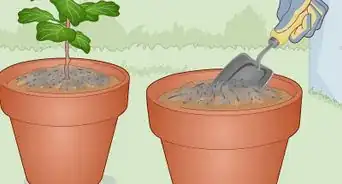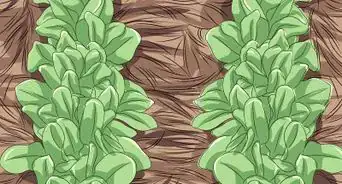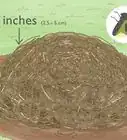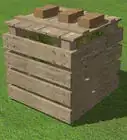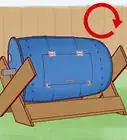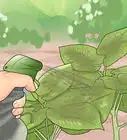X
wikiHow is a “wiki,” similar to Wikipedia, which means that many of our articles are co-written by multiple authors. To create this article, volunteer authors worked to edit and improve it over time.
This article has been viewed 130,972 times.
Learn more...
Has your compost turned into the local rodent cafe? Give the furry critters their marching orders!
Steps
-
1Review what you're adding to the compost. Some foods may attract rodents more than others, such as bread and baked items. Avoid putting these in, in particular cooked and processed foods. In addition, do not add meat or fish waste to the compost.[1] Also, keep dairy products, bones, oils, fatty foods, and pet manures out of the heap.[2] (Meat, fish, and dairy shouldn't be composted for any reason in a normal, backyard compost, because these can harbour human pathogens that can harm you.[3] )
- Rats that keep coming back are likely to be after vegetable scraps. You might need to stop placing these into the heap until you've solved the problem by redesigning the compost or getting rid of the rats through other means. (This means only adding yard waste, not household food scraps.)
-
2Keep the pile moist and turn it regularly.[4] It's less like a comfortable, dry home when it's damp and getting agitated frequently!
- The ideal moisture of a compost heap is about the same as a wrung out dish sponge.
- Seek a good balance between green and brown materials in the compost to maintain a decent level of moisture. Add water if the heap becomes too dry.
- Materials high in carbon (e.g., dry leaves or dead plants) placed at the bottom of the compost pile and lining the walls of the bin can improve airflow, control odour, and help with drainage.[5] Just be sure to keep this "brown" material moist.
Advertisement -
3Visit frequently. Rats and mice are shy when it comes to human disturbance, so daily visits from you can be a good deterrent in itself.
-
4Review the design of the compost. If the compost isn't turning vegetable waste into something less attractive to rodents within 24 to 48 hours, the design of the compost needs to be changed.[6] You might need more nitrogen, more bulk to ensure that the compost is heating up enough, smaller compost scraps and more moisture.[7]
-
5Bury food waste deeply.[10] If rodents seem to be feasting, make it hard for them to get to the tastier morsels (the kitchen scraps) by burying them into the middle of the compost, with the other vegetation layers over the top.
- Alternatively, if you don't want to bury the scraps every time, keep a scoop next to the bin and add a layer of leaves, soil, or finished compost over the food scraps each time they're added.[11] These cover up the food odour and microorganisms in soil help to speed up the composting.
-
6Encourage local birds of prey to visit the compost heap by locating it near tree branches. Leave the lower limbs of such trees intact.[12]
-
7Provide plenty of physical barriers against rodents. Keep a lid on the compost heap. Always ensure your compost bin or heap has a lid to keep the local wildlife out of it. To prevent access from burrowing under, stand the bin on 1/4 inch wire mesh.[13] This mesh can also be used to cover up any gnawed holes.
- The benefit of the mesh wire over other sorts of stands is that it allows worms free access and having worms in your compost is very desirable, as well as also providing drainage.
-
8
Advertisement
Community Q&A
-
QuestionHow do I get the huge rat out of our compost bin? It appears to be living there and possibly is pregnant!
 DonaganTop AnswererTurn the compost by digging it up and re-layering it. That will chase out pests and aerate the pile at the same time.
DonaganTop AnswererTurn the compost by digging it up and re-layering it. That will chase out pests and aerate the pile at the same time. -
QuestionIs it safe to put compost in the garden? (I discovered mice in the compost and am worried about diseases.)
 Community AnswerFecally-contaminated compost will not be safe for use in the growing of food crops for five years unless you sterilize it. To sterilize, heat it up and keep the temperature over 160 F for 40 minutes. Use a long meat thermometer or a special compost-heating thermometer to make sure you do this job properly, or people could die. It is safe to use fecally-contaminated compost on lawns, trees that do not bear fruit, or shrubbery, but you have to be 100% certain that it won't be spread into areas where food is grown for five years, even in heavy rainfall.
Community AnswerFecally-contaminated compost will not be safe for use in the growing of food crops for five years unless you sterilize it. To sterilize, heat it up and keep the temperature over 160 F for 40 minutes. Use a long meat thermometer or a special compost-heating thermometer to make sure you do this job properly, or people could die. It is safe to use fecally-contaminated compost on lawns, trees that do not bear fruit, or shrubbery, but you have to be 100% certain that it won't be spread into areas where food is grown for five years, even in heavy rainfall. -
QuestionIs it safe to use compost if I know rats have been in it going to the bathroom?
 Community AnswerNo. Rat feces carries numerous deadly pathogens that can easily spread to fruit and vegetables when contaminated compost is used as fertilizer. Any compost that contains feces from meat eating animals harbors disease and should therefore not be used.
Community AnswerNo. Rat feces carries numerous deadly pathogens that can easily spread to fruit and vegetables when contaminated compost is used as fertilizer. Any compost that contains feces from meat eating animals harbors disease and should therefore not be used.
Advertisement
Warnings
- Always wear gloves when handling compost. This protects you from the potential transfer of human pathogens if any are present but it might also protect you from a rodent bite should you be so unlucky.⧼thumbs_response⧽
- Too many lawn clippings might appear like nesting material. Mix these in well to avoid their use as such.⧼thumbs_response⧽
Advertisement
Things You'll Need
- Compost bin that prevents rat or mouse entry
- Mesh wire
- Soil/compost/dead leaves for layering; scoop
- Gloves for handling compost
References
- ↑ Tim Marshall, Composting, p. 72, (2008), ISBN 978-0-7333-2416-1
- ↑ http://www.toronto.ca/compost/pest.htm
- ↑ http://whatcom.wsu.edu/ag/compost/ratsincompost.htm
- ↑ http://whatcom.wsu.edu/ag/compost/ratsincompost.htm
- ↑ http://www.toronto.ca/compost/pest.htm
- ↑ Tim Marshall, Composting, p. 72, (2008), ISBN 978-0-7333-2416-1
- ↑ Tim Marshall, Composting, p. 72, (2008), ISBN 978-0-7333-2416-1
- ↑ http://www.toronto.ca/compost/pest.htm
- ↑ http://www.guardian.co.uk/lifeandstyle/gardening-blog/2009/may/06/gardens-compost
- ↑ http://whatcom.wsu.edu/ag/compost/ratsincompost.htm
- ↑ http://www.toronto.ca/compost/pest.htm
- ↑ Tim Marshall, Composting, p. 72, (2008), ISBN 978-0-7333-2416-1
- ↑ http://whatcom.wsu.edu/ag/compost/ratsincompost.htm
- ↑ http://www.toronto.ca/compost/pest.htm
- Tim Marshall, Composting, p. 72, (2008), ISBN 978-0-7333-2416-1 – research source
About This Article
Advertisement
